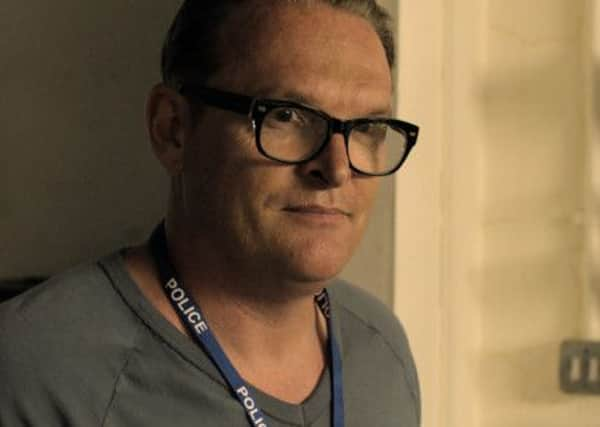Tony Pitts: How I went from Emmerdale to Spielberg


The call goes through to Brighton, where actor Tony Pitts lives in a coastguard’s cottage overlooking the sea. “I’m floating around like Kipling during the day,” he laughs as he juggles multiple jobs that range from finishing the edit on a newly recorded radio play to prepping a film, Funny Cow, which he will direct with stars including Martin Freeman and Stephen Mangan.
Then there’s just time to fit in some PR about Hyena, the scalpel-sharp crime thriller about corrupt cops from director Gerard Johnson. Pitts plays Keith, a policeman engaged in skimming cash from the profits of drug dealers. He’s a big man and imposing on screen. The deliberate retention of a flat Sheffield accent – he was born in Rivelin and raised in Crookes – adds to the persona of a no-nonsense character.
Advertisement
Hide AdAdvertisement
Hide Ad“I’ve got a bit of gravitas, that Yorkshire thing and a bit of size so I invariably play hard or corrupt – or hard and corrupt – people,” he says. “That’s the nature of it – what I tend to get. I’ve never made the mistake of complaining because that’s what pays the bills. I’ve not been troubled to give my priest yet, let’s put it that way. I could do it! But they’re not kicking down the doors to see that.”


Hyena has been praised for its style and intensity. Pitts signed up quickly after seeing Tony, the director’s first film and a bleak and brutal tale of a London serial killer. He found himself working with a veritable band of brothers that included actors Peter Ferdinando, Stephen Graham and Neil Maskell.
“Pretty much all those people you’re watching in that film are my friends. We’re kind of a tribe. There are tribes within tribes. Neil Maskell, Stevie Graham, we’re friends and similar people, and I liked Gerard. I liked the cut of his jib from the moment I met him. None of us will be millionaires out of it but everybody cared, which is a good feeling.
“The film doesn’t let up. It’s pretty relentless, visceral. There’s no sugar with the medicine.”
Advertisement
Hide AdAdvertisement
Hide AdHe pauses. “I don’t like to think I’m naïve; I like to think I’m a man of the world but they gave us a lot of research material about [that world] and that really was an eye-opener. It’s just that idea of going about your day and never really knowing who you’re brushing up against and what they’re about.”
Pitts was a trainee truck mechanic on a college course when he was discovered by Ken Loach and cast in the 1981 film Looks and Smiles as an unemployed Northern lad who joins the Army. Sent to Northern Ireland, he returns brutalised by his experience. As he had with Kes and many of his other films, Loach sought out non-actors to provide a realistic base. Pitts found himself hired after improvising a scene about a stolen moped. “The other lads in the class were a little more reticent than I was,” he recalls.
He was quickly cast, left the shop floor at Kevin’s Truck Mechanics and walked straight onto a film set. With the final scene came a reality check.
“It was kind of like the circus arriving and when they left the dust settled. That’s always the way with Ken. In retrospect, it was a huge, life-changing event but at 18 it was just a nice thing to be involved in.
Advertisement
Hide AdAdvertisement
Hide Ad“I literally went from the shop floor at Kevin’s Truck Mechanics on Friday to shooting. Maybe it was an age thing but I just took it in my stride. I thought ‘I quite like this and I’d quite like to do some more of it’. Kevin’s were only too delighted. They agreed totally that I might be better off in make-up than overalls.” And thus Pitts stumbled into an acting career.
He enjoyed television fame as rough-hewn Archie Brooks in Emmerdale, appearing in 30-plus episodes over a period of ten years until he was killed off in the infamous plane crash in 1993.
Being out of work led to a period of deep introspection that lasted half a dozen years. Pitts filled his days writing, filling piles of notebooks with stream of consciousness thoughts that occasionally made sense but often did not. He’s been a scribbler since he was seven. Now he’s discovered he has a talent for it. And radio producers are queuing up to commission his work.
“Between Emmerdale and starting my acting career proper again, I had time. I can’t begin to tell you how much I wrote. Cupboards and cupboards and cupboards full of stuff. All very scattergun. I wasn’t even particularly interested in showing it to anybody. I just needed to write. You’re trying to catch time and feeling, that’s what it is.”
Advertisement
Hide AdAdvertisement
Hide AdOne episode that became a drama involved Liam Jones, a friend from the boxing gym who struggled with heroin addiction and later succumbed. Pitts poured his emotion and grief into a play, On It, that chronicled Liam’s battles, how his addiction affected those around him and ultimately, his death. The piece, starring Adam Gillen, Maxine Peake and Joanne Mitchell, was broadcast by Radio 4 and won Gold at the Radio Academy Awards in 2012. The judges called it “gripping, heart-breaking, unsettling, unexpected” and added: “The production would not have worked as well in any medium other than radio.”
I ask the obvious question about catharsis. Did winning the award allow him to close the door on his pain? Pitts’ answer is given bluntly but not harshly. “No. It’s a process, isn’t it? Which is why I write. I always feel one step removed from whatever I’m doing. So I write to process things. The actual process didn’t feel cathartic.
“The interesting thing was that I didn’t cry at the time, when we buried him, when I wrote [the play] or when I went and spoke to his mum and presented her with what I’d written. But the minute I sat down with my friends and read it… I cried for two days. I’m very wary of saying things like ‘It’s drawn a line’. I write to get some sense of things and to get some sort of control.”
He worked again with Peake, “a big mate”, on Pact, another radio drama about a suicide pact and will reunite with her on Funny Cow, the tale of a female comedian. And he gave singer/songwriter Richard Hawley, a fellow Sheffielder, his first shot at acting in Monster, a radio play to be broadcast on March 26. The subject: male anger against the backdrop of junior football.
Advertisement
Hide AdAdvertisement
Hide AdHe calls radio “the last bastion, along with stand-up comedy, where you can genuinely have your own voice”, and praises Jeremy Howe, the commissioning editor at Radio 4, for having the nerve and gall to back his proposals.
“I love radio. It’s a great medium. I actually think it is the most powerful medium. And if it’s just you with a voice wherever you are in the world of distractions it’s a hugely powerful medium. They ask me what I want to do and then they very kindly let me do it.
“I’ve no interest in writing for other people or episodes of anybody else’s stuff. I’m not a writer for hire. Jeremy Howe lets me do really difficult subject matter and has shown a lot of trust. That’s a good feeling. I love the freedom it gives me because I direct as well. It’s less money but a thousand times more satisfying than anything else.
“I’ve been lucky. I have won a few awards but it’s not so much that. It’s the people who’ve told me that they’ve pulled the car over and couldn’t carry on driving. There are not many mediums that can do that.”
Advertisement
Hide AdAdvertisement
Hide AdAnd not many British actors can claim to have been directed by Ken Loach and Steven Spielberg. Alongside Benedict Cumberbatch, Tom Hiddleston and Eddie Marsan, Pitts played an NCO in War Horse. Add Gerard Johnson to the mix and his film career is gathering pace as he heads towards 60. The combined experience might be useful as he prepares to helm Funny Cow.
“I think it’s about scale. The daily experience changes with how much money’s floating about. But ultimately they’re all committed to telling stories. They have in a common a love of film and they’re all directors. But they work in different ways. Spielberg, actually, was probably the easiest. He was fantastic to work for. Any nerves you might have at the idea just disappear the minute you meet him. But he would be good at his job, wouldn’t he, considering the career he’s had?”
From truck mechanic to Emmerdale to Red Riding, Scott & Bailey, War Horse, Line of Duty, Peaky Blinders and Remember Me, to an award-winning career turnaround in acclaimed radio drama. What a rollercoaster ride it has been. Is he amazed at the road he has taken?
“I’m sure if I’d have said to that 17-year-old boy who was in the Ken Loach film, ‘This is what’s in your path’ he might have found it difficult to believe. That’s a thing I’m increasingly interested in: I can see myself at different stages of my life and they are all unrecognisable to me. You have a vague sense of what you were at 25, we all do, and I’ve got little bits of memories that are jumbled. I don’t know what I expected or that I necessarily expected anything. Some people have a great will and ambition to be something. So far it’s all felt like water finding a way. Water always finds a way down and out. That’s how it’s felt.
Advertisement
Hide AdAdvertisement
Hide Ad“Am I amazed? No, not really. That could be taken arrogantly but I don’t mean it that way. You flow through and life opens up in front of you. It’s all such a fluid reality.”
Radio 4 will broadcast Monster on March 26. Hyena is on general release.